How to Get Clients as an Intellectual Property Lawyer in 2025
Getting clients as an intellectual property lawyer isn’t easy.
You may know every bend and corner in the intellectual property landscape like the back of your hand. But for some IP attorneys, lead generation through traditional and digital marketing channels is a new frontier.
This guide will cover everything you need to know to get more clients as an IP lawyer.
Let’s get started.
9 Strategies to Get Clients as an IP Lawyer
Here are nine must-have strategies to start generating IP legal leads online:
1. Build a GBP Profile
A well-optimized Google Business Profile will make your IP law office visible to nearby search engine users.
We’re not just talking about regular search engine listings. If you pay attention to your GBP, people will see you in the “Local Pack.” This is an eye-catching, interactive map section of the search results with a detailed list of businesses.
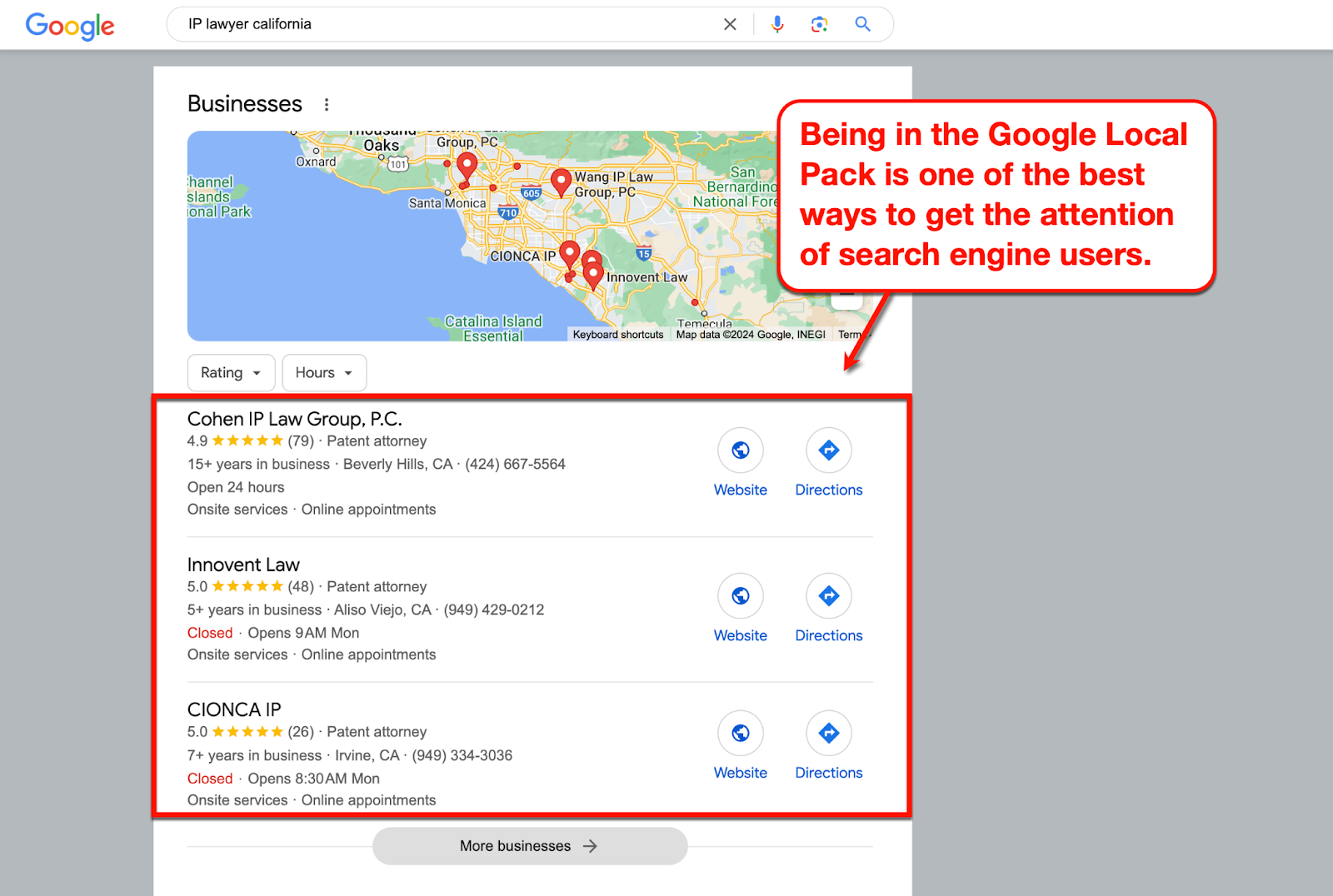
Setting up your Google Business Profile is easy and free. Just add or claim your law firm’s office location on Google Maps and complete the mandatory verification process — you’ll be up in running in a few days.
Some tips on optimizing your Google Business Profile include:
- Ensure the accuracy of your law office’s information.
- Upload professional photos of the location, your staff, and some landmarks to help prospects find you.
- Post original, informative content to the “Updates” section.
2. Start Local SEO
Setting up a Google Business Profile is one of the most important stepping stones to effective local SEO.
If you want to attract more leads to your website, you need local SEO strategies like listing your law firm in local directories, optimizing for local keywords, and generating more online reviews.
Use Google to easily find local business directories. For example, if your IP law firm is located in San Francisco, just type in a keyword like “lawyer directory San Francisco.” The best and most popular directories should be at the very top of the organic results.
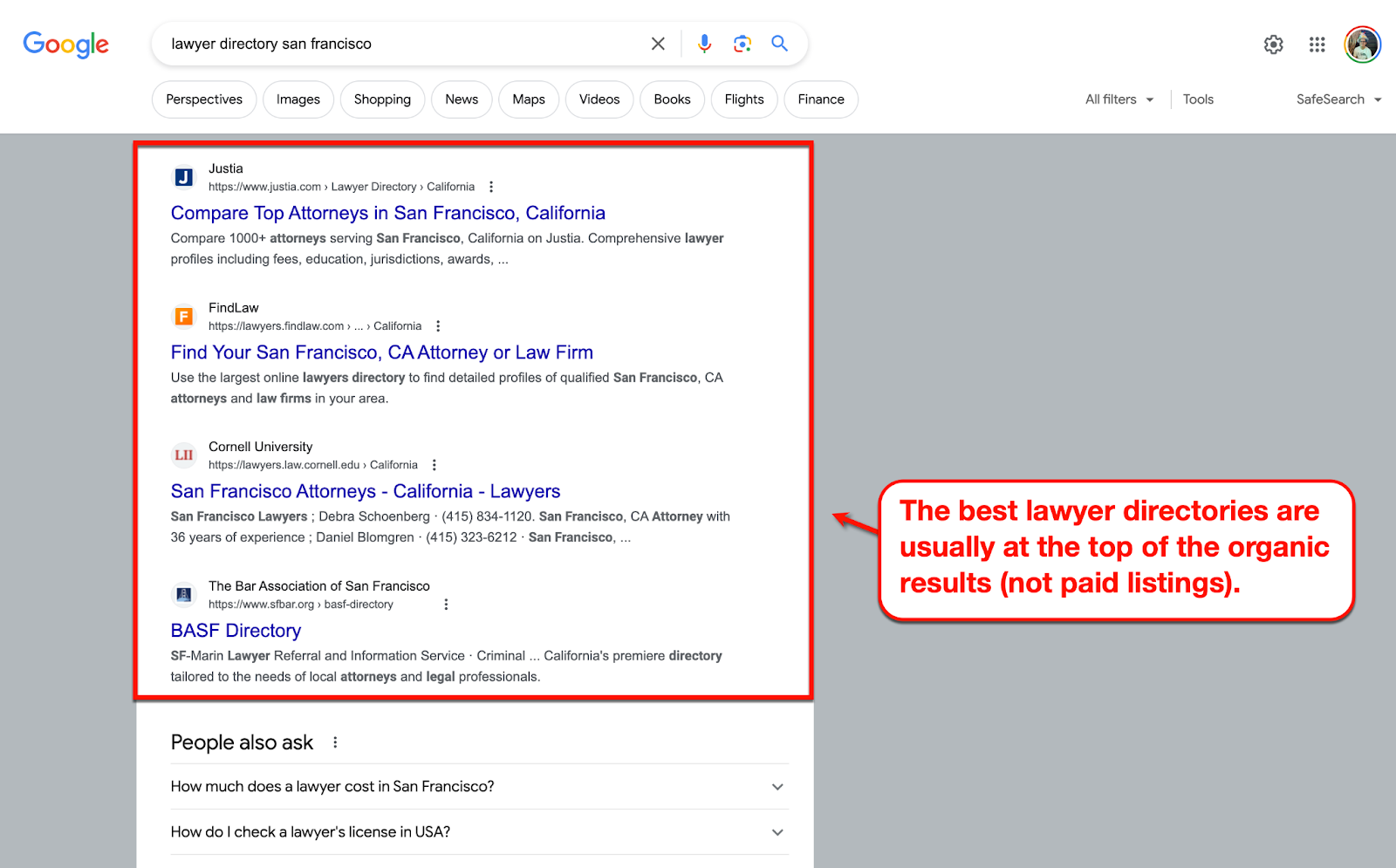
Just remember that some lawyer directories charge a listing fee, which is periodically renewed on a monthly or annual basis.
On the flip side, directory listings expose your firm to potentially thousands of users in need of legal professionals.
Another crucial component of a local SEO strategy are authentic, positive reviews from your satisfied clients. These can pile up quickly in your Google Business Profile and lawyer directory listings, especially if you use the following tactics:
- Automate review requests via email using tools like GetResponse and Campaign Monitor.
- Incentivize reviews with rewards like gift cards, free merchandise, and cash.
- Reach out directly to past clients and people who mention your firm on social media.
Finally, you can’t ignore the importance of an IP law firm website when doing local SEO. This brings us to the next strategy.
3. Build an IP Law Firm Website
A well-designed website lets you rank in organic search engine results, publish landing pages that convert visitors into paying clients, and provide important information about your firm to the online community.
The good news is, building a professional business website is easier than ever.
There’s a lot of law firm website builders available out there for all goals and budgets. Tools like SquareSpace, Wix, and Webflow feature drag-and-drop page editors that allow non-developers to quickly create aesthetic pages without any coding skills.
It’s also easier than ever to build a law firm website using Content Management Systems (CMS) like WordPress — the platform that powers 40% of the entire internet. It features a user-friendly dashboard interface, customizable themes, and a collection of plugins that extend your website’s functionality.
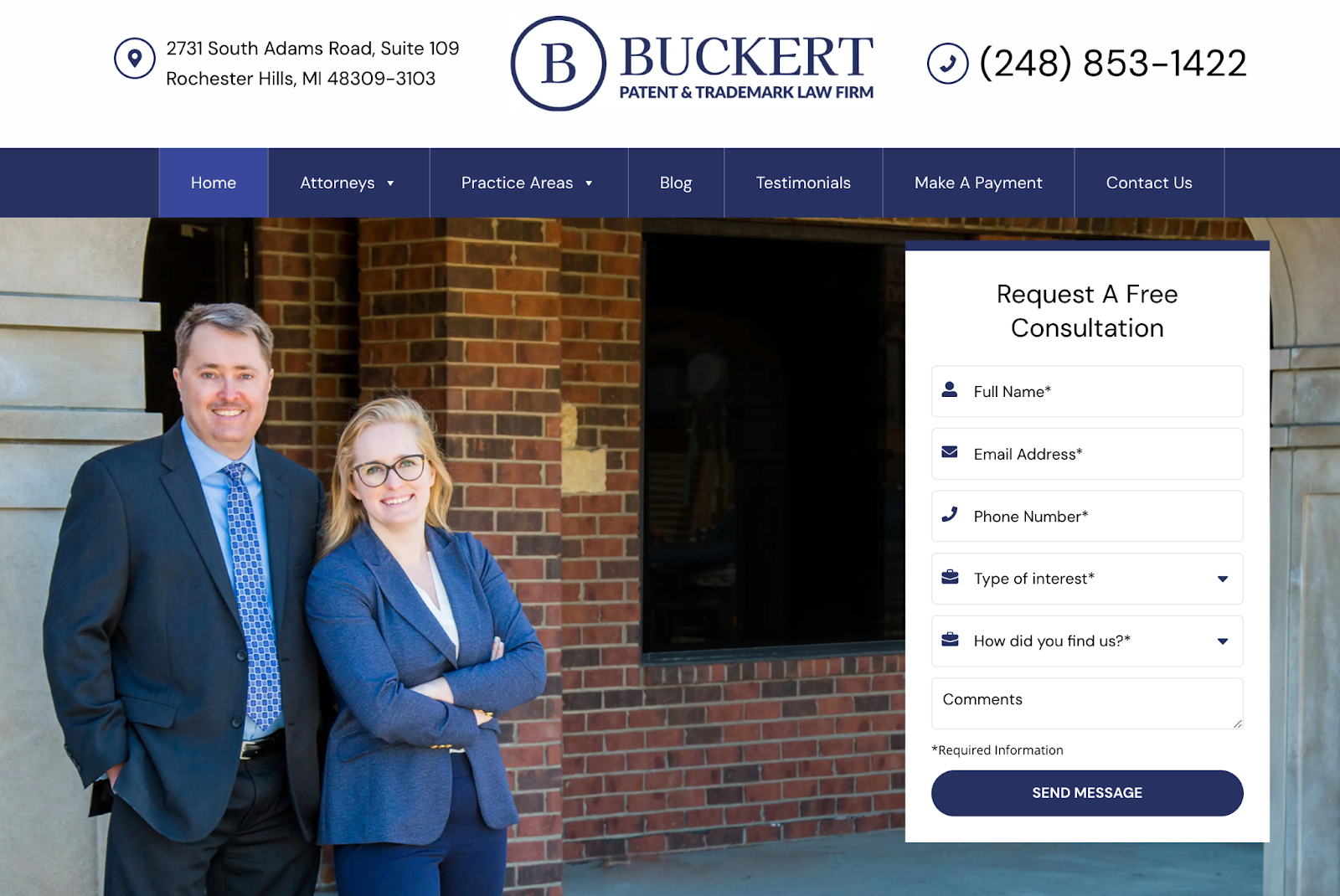
There are a few things you need to remember when building your intellectual property law firm website:
- Highlight ways for potential clients to contact you. Insert your firm’s contact number and address to make it easier for prospects to reach out. You should also create a dedicated “Contact Us” page and present visitors with contact forms where they can see it.
- Use professional photography. Avoid using royalty-free stock images as they may cheapen the look and feel of your website. Instead, use professional attorney portraits and original photos to make the user experience more memorable and compelling.
- Build dedicated landing pages for different practice areas. Craft practice area landing pages with a unique value proposition and Call-To-Action (CTA) targeted at potential clients with specific problems. These should focus on specific legal fields, like patent law, copyright law, trademarks, and so on.
4. Network With Attorneys and Speak at Conferences
Building business relationships through digital and traditional methods will boost your firm’s reputation, reach, and exposure.
Networking for attorneys is a whole web of challenges that require a holistic approach. You need a keen eye for networking opportunities and a clear action plan for leveraging them, such as participating in bar associations, collaborating with local businesses, and utilizing social media marketing.
Speaking at events like legal workshops, seminars, and other CLE events is another strategy that will help your firm raise brand awareness. Not only does it let you connect with other legal professionals, it’s also a proven way to get the local community talking about your IP law firm.
You’ll find speaking opportunities at marketplaces like SpeakerHub or your local bar association’s website.

5. Publish High-Quality Content
For lawyers, high-quality content is the primary building block of a wide and authoritative online presence. But you can’t just upload one or two top-notch articles and expect your website to rake in online visitors.
To maximize the results of law firm content marketing, implement a content strategy that ensures every piece contributes to your business goals.
Here are the steps you should follow:
- Define your content marketing goals. Define what you want to accomplish with your content, your timeline for results, and the metrics you’ll track to measure success.
- Identify your ideal audiences. Understand your target audience, including the topics they’re interested in, the keywords they use, and their preferred content channels.
- Analyze other successful IP attorneys. Research the top IP and patent attorneys in your location and borrow ideas from the content they publish.
- Diversify your content strategy. Explore law firm website content formats like blog posts, case studies, newsletters, customer success stories, and testimonial videos to identify what works for your marketing goals.
- Leverage multiple content promotion channels. Aside from your website, publish content on other channels to maximize your online reach — from social media platforms to Q&A websites.
As a rule of thumb, always produce content with your target audience in mind. Publish content to answer questions and offer solutions. This will encourage them to learn more, help you earn their trust, and make them more likely to hire you.
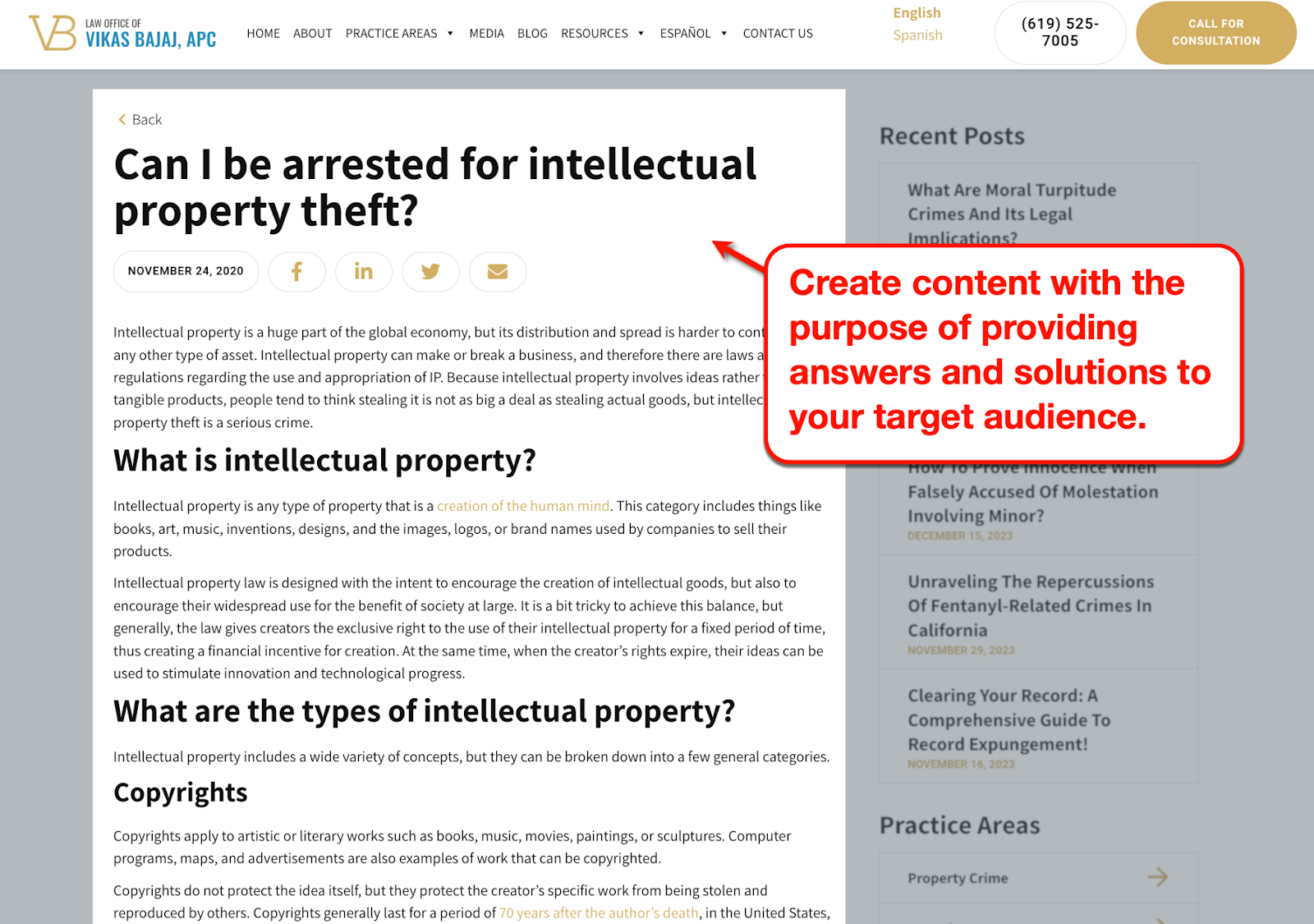
In addition, it’s important to build the right team to handle all content-related tasks. Your options include assembling an in-house team and outsourcing your efforts via freelancers or content marketing agencies.
6. Kick Off Organic Attorney SEO
Publishing high-quality content on your legal blog will also help you with organic SEO. But first, you must incorporate a keyword strategy into your content production.
This requires specialized tools that help you find target keywords based on metrics, like:
- Monthly search volume. This metric lets you analyze the traffic potential of a keyword. The higher the search volume, the more people you can reach through organic SEO.
- Keyword difficulty. In SEO, keyword difficulty measures how hard it is to rank for a keyword. This metric factors in the SEO profiles of competitors that target the same keyword in their campaigns.
- Search intent. People use search keywords with a specific goal in mind, be it to do research, find a company’s website, or make an online purchase. Understanding search intent allows you to tailor your content strategy to what your audience wants to do.
Some of the best keyword research tools for lawyers include Ahrefs, Ubersuggest, and Semrush.
You can also invest in on-page optimization tools like Surfer and Clearscope to get recommendations for your content, including the keywords to insert, target word count, and subheadings to use.
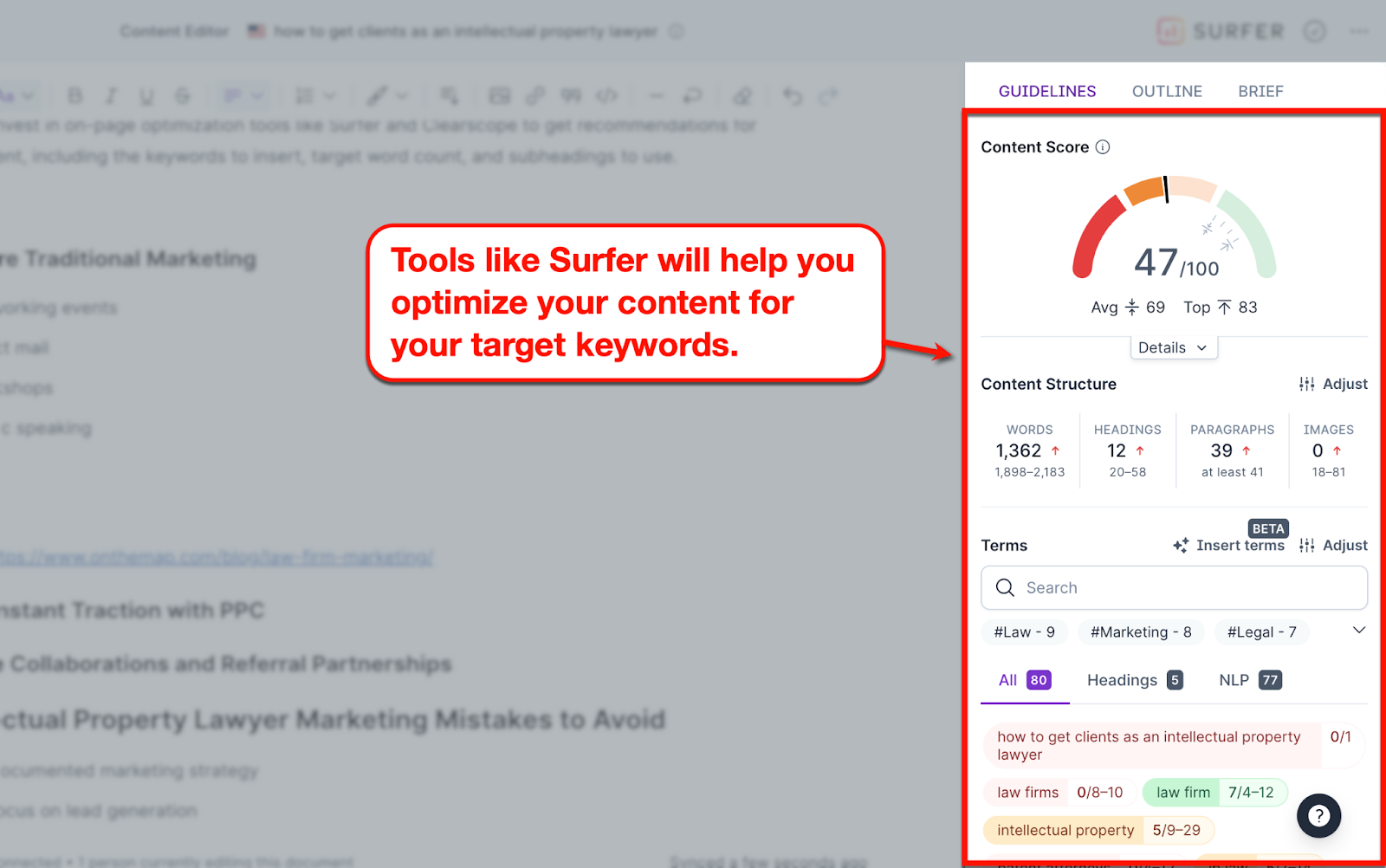
SEO for lawyers don’t stop at keyword optimization.
The next order of business is to generate high-quality inbound links — AKA backlinks — to your website. This can be done through different link building strategies, like:
- Submitting guest posts to relevant and authoritative legal websites.
- Creating roundups, surveys, or expert interviews and requesting participants to link to your content.
- Publishing original data and statistics as a listicle, PDF report, or long-form blog post.
- Hiring a law firm SEO agency to build backlinks on your behalf.
7. Explore Traditional Marketing
Apart from networking and public speaking, IP and patent law firms use other traditional marketing strategies for lead generation.
Attending networking events within legal or non-legal communities is a prime example of this. This includes charity events, legal workshops, and other local events that put you within arm’s reach of potential clients.
Bar associations often post schedules of upcoming events for the legal crowd. If you’re targeting a general audience, use social media or platforms like Eventbrite for events near you.
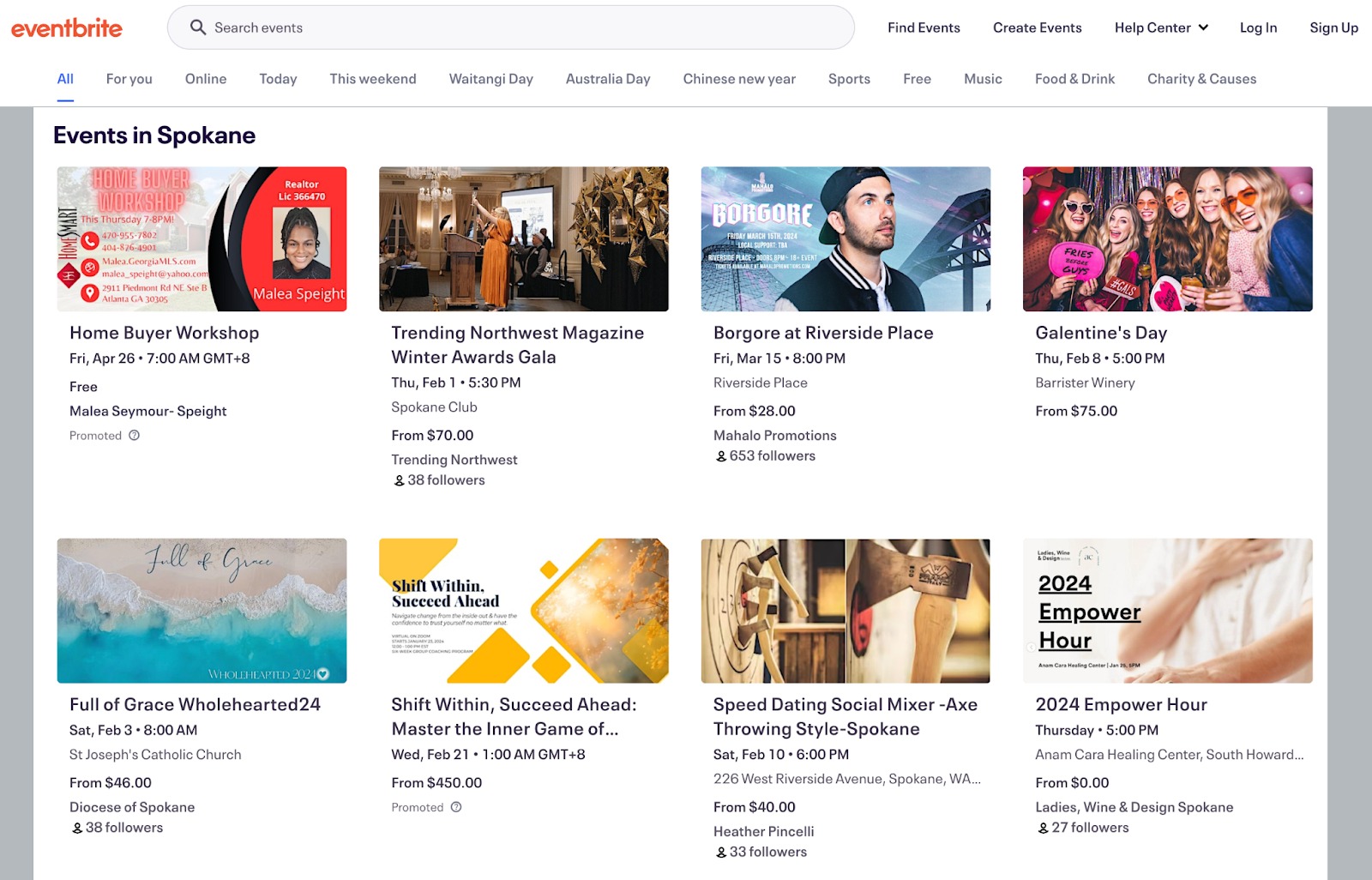
Another traditional law firm marketing strategy you could try is sending direct mail to prospective clients. Your mail should first and foremost contain valuable information for your recipients.
More importantly, it should include a clear and visible CTA that encourages them to connect with your firm, be it by phone, email, social media, or walk-in visitation.
8. Get Instant Traction with PPC
PPC — short for “Pay Per Click” — is an advertising model wherein you pay for every person who clicks your ad. This means you only spend money whenever your ad actually brings a visitor to your law firm website.
A huge advantage of PPC advertising is, you get to skip all the time-consuming aspects of SEO and appear at the top of search engine results. The drawback is, PPC isn’t ideal in the long run since your campaign will continue to cost money whether or not you’re converting visitors into new clients.
You can plan, launch, and manage PPC advertising campaigns through platforms like Google Ads.
Here’s a short checklist to help you make the most out of your advertising dollars:
- Use location-specific audience targeting and ad copy.
- Opt for manual bidding for your first campaign.
- Create compelling ad copy.
- Optimize your landing page for conversions.
- Conduct A/B testing to refine your PPC strategy over time.
9. Strike Collaborations and Referral Partnerships
Intellectual property attorneys can leverage word-of-mouth marketing through collaborations and referral partnerships.
You may choose between other law firms, local businesses, bloggers, or social media influencers when planning collaborations.
If you partner up with another firm, you can agree on swapping leads depending on the client’s required legal services and your practice areas. When partnering with everyone else, use referral marketing platforms like ReferralCandy, Refersion, and Friendbuy to track where your leads are coming from.
Intellectual Property Lawyer Marketing Mistakes to Avoid
Before we wrap up this post, here are three marketing mistakes you should avoid at all costs:
No documented marketing strategy
Managing a marketing campaign, especially if you’re busy running an IP legal services business, is next to impossible without a documented marketing strategy.
As good as your memory is, it’s important to have a shareable document ready that contains everything in your marketing plan. This includes your target audience, marketing goals, content channels, and marketing team roles.
Use tools like Notion, Trello, or Asana to make sure everyone in your team is on the same page — at all times.
No focus on lead generation
In marketing, the number of visitors you get is just a vanity metric unless it results in more leads and clients.
Always focus on your end goal when making decisions in your IP law firm marketing campaign.
In keyword research, look for keywords that potential leads will use when they seriously need legal help. When publishing content, sprinkle it with CTAs that further your relationship with prospects.
Not tracking KPIs
A Key Performance Indicator (KPI) is a metric that measures the success of your firm in accomplishing a business goal.
It’s a level above metrics like website traffic, social media followers, and email subscribers. Some examples are:
- Conversion rate — The percentage of visitors and leads who convert into paying clients.
- Customer Lifetime Value — The revenue generated by a client throughout their relationship with your firm.
- Cost Per Acquisition — The amount you spend through ads, SEO, or content marketing per lead you generate.
If you’re looking for a platform for tracking KPIs, start with Google Analytics. This allows you to monitor a range of website performance metrics, including custom KPIs and conversion goals.
Get Expert Intellectual Property Lawyer Marketing Services
We know — learning how to get clients as an intellectual property lawyer is a lot to take in. Realistically, you’re looking at weeks or months of research and planning before your marketing efforts bear results.
If you need to generate leads fast, the more practical route is to hire freelancers or a full-service digital marketing agency to do all the heavy lifting. Contact us here today and let’s brainstorm a marketing strategy that fits your budget.
Table of Contents
Related Articles
Dominate Your Market with Digital Marketing Services That Deliver
Talk to a certified professional today, and we will design a strategy specific to your case.






